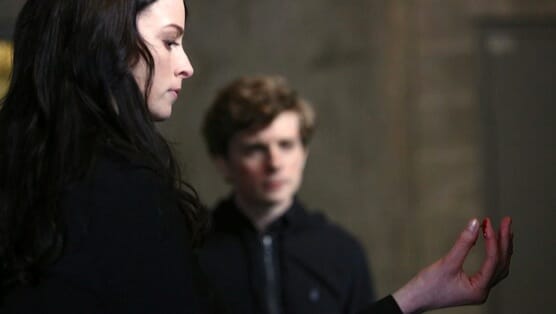Continuum: “Last Minute”
(Episode 3.13)

We’ll do ourselves a favor upfront: We’re going to abandon logic. Forget it. Throw it away. The wind will have it. You must not. You throttle the boat, and it is your lifejacket. You soar on a roller coaster, and it is your harness. You roar on a motorcycle, you paddle through rapids, you explode from a cannon—and it is your helmet. Choose your means of transport; it is that which tethers you to life and limb. Safety is for cowards. Cut the tether. This is a place of fun.
This season of Continuum should have started with a disclaimer. It would have read: Farewell. “Last Minute” capped this third season. Here is what happens. Young Sadler “sends a message” to Alec. The gang teams up with Liber8. They conspire to swap the Alecs. The plan fails. The boy geniuses engage in a battle of brawn. Alec kills Young Sadler. That plan fails. Brad activates a homing beacon. Future cavalry arrive. The Rastaman gurgles: “It has begun.” Kellog wins. If I could trace the fermentation of it all, I would. But aha! Farewell.
At first, the show seemed to be suffering from burdensome storytelling. The plotlines didn’t arc so much as duplicate. Nothing cohered. For large stretches, Liber8 disappeared. They were never the most cunning of revolutionaries, but regularity has its uses in lieu of inspiration. When they lost that, we lost them. Instead, one of them would show up for an expository line every few episodes. Two lines, if they were lucky. A given episode couldn’t afford much more. Kiera’s heart, Young Sadler’s culpability, Carlos’s sanity—everything was individual, overlapping only when the staff had vacuumed out all the life.
In place, it’s become a show that doesn’t unpack itself. When it wants to misdirect or layer, it sends in backup. Kellog and Curtis team up in “So Do Our Minutes Hasten.” One scene. Kellog finagles his way into Piron in “Minutes of Silence.” Two scenes. In “Revolutions Per Minute” he does Sonya a favor, and in “3 Minutes to Midnight” he struts from nothingness into the tail end of a verbal showdown because he’s Kellog. Two more scenes. The cherry is “The Dying Minutes,” in which Curtis dices Cynthia with a pair of tant?. Where does it lead? To Kellog informing Alec that he’d been duping Young Sadler into appropriating company authority for him. We find this out as Alec does: in the finale’s closing minutes. This is a collection of scenes, not plotting. The sense of something’s up is anonymous. It leads to a climax that cold-shoulders every tangential particular of its supposed rising action. “I’ve been doing it for weeks,” Kellog tells Alec. Really? Where’s the camera been?
-

-

-

-

-

-

-

-

-

-

-

-

-

-

-

-

-

-

-

-

-

-

-

-

-

-

-

-

-

-

-

-

-

-

-

-

-

-

-

-








































